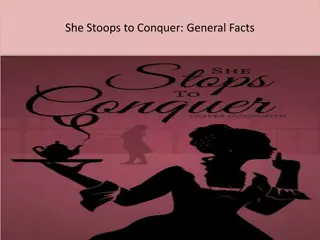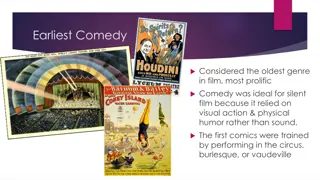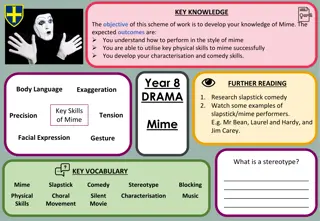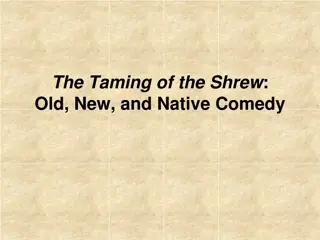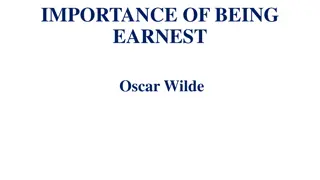
Understanding Comedy of Manners in Literature
Explore the comedic genre of Comedy of Manners, known for satirizing societal manners and standards, featuring stock characters and witty dialogues. Discover its characteristics and key elements exemplified in works like "The Importance of Being Earnest."
Download Presentation

Please find below an Image/Link to download the presentation.
The content on the website is provided AS IS for your information and personal use only. It may not be sold, licensed, or shared on other websites without obtaining consent from the author. If you encounter any issues during the download, it is possible that the publisher has removed the file from their server.
You are allowed to download the files provided on this website for personal or commercial use, subject to the condition that they are used lawfully. All files are the property of their respective owners.
The content on the website is provided AS IS for your information and personal use only. It may not be sold, licensed, or shared on other websites without obtaining consent from the author.
E N D
Presentation Transcript
Definition The comedy of manners, also called anti-sentimental comedy, is a form of comedy that satirizes the manners and affectations of contemporary society and questions societal standards. Social class stereotypes are often represented through stock characters such as the miles gloriosus ("boastful soldier") in ancient Greek comedy or the fop and rake of English Restoration comedy, which is sometimes used as a synonym for "comedy of manners".[1]A comedy of manners often sacrifices the plot, which usually centers on some scandal, to witty dialogue and sharp social commentary. Oscar Wilde's play, The Importance of Being Earnest (1895), which satirized the Victorian morality of the time, is one of the best-known plays of this genre.
Stock Character A stock character is a stereotypical fictional person or type of person in a work of art such as a novel, play, or a film who audiences recognize from frequent recurrences in a particular literary tradition. There is a wide range of stock characters, covering men and women of various ages, social classes and demeanors. They are archetypal characters distinguished by their simplification and flatness. As a result, they tend to be easy targets for parody and to be criticized as clich s. The presence of a particular array of stock characters is a key component of many genres, and they often help to identify a genre or subgenre. For example, a story with a knight- errant and a witch is probably a fairy tale or fantasy.
features The characteristics of a comedy of manners include: the use of double entendre and other forms of risque language. elaborate plots. cross-dressing (usually women in men's clothing) physical seduction. extramarital affairs. cynicism. the meeting of the aristocracy and common folk. intrigues such as forgeries and spying.
Characteristics The main elements of the Comedy of Manners are the following : The action takes place in London Characters are often from the upper class. They are beautiful and refined. The plot is often about an illicit love affair or some other scandal The play features at least one pair of very intelligent young lovers The woman in these plays are emancipated , bold and emancipated , unlike the heroines of sentimental dramas.
To be continued Witty dialogue is one important feature of the comedy of manners.the play appeals to the intelligence of the audience rather than their emotions. The plays are mildly satirical. The ildleness , manners and affectations of the upper class are criticized in a gentle , witty way. The institution of marriage is always held to ridicule.Both husbands and wives openly express their dissatisfaction of their spouses. These plays also portray the idle lifestyle of the rich society with much realism.


